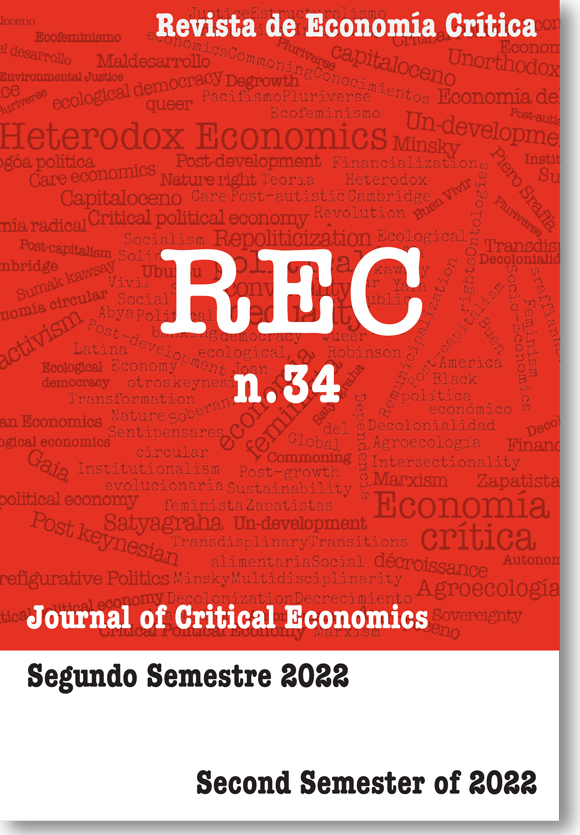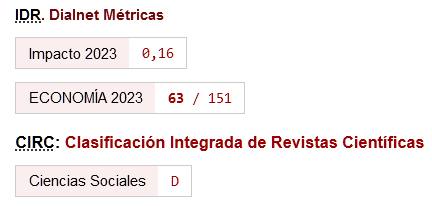Sistemas productivos.
DOI:
https://doi.org/10.46661/rec.10328Resumen
En los últimos años está teniendo lugar entre una porción creciente de economistas una reafirmación, cada vez más dogmática, de los efectos benéficos de la mano invisible de las fuerzas del mercado y de los efectos perniciosos que tienen los controles institucionales y la acción del gobierno sobre el bienestar. Estos argumentos no se basan en un análisis detallado del funcionamiento de las economías reales sino que se plantean en abstracto, mediante un razonamiento apriorístico de cómo deberían funcionar. Se presupone que las fuerzas socio-políticas o bien no afectan a los resultados del mercado o bien distorsionan el funcionamiento del mismo, en cuyo caso deben cambiarse para hacerlas compatibles con las previsiones de la teoría económica.
Descargas
Citas
Boyer, R. (1979). Wage formation in Historical Perspective: The French Experience. Cambridge Journal of Economics, v 3, nº 2 June, 99-118.
Bluestone, B. y Stevenson M.H. (1981). Industrial transformation and the evolution of dual labour markets: the case of retail trade in the U.S. en: F.WILKINSON (ed.) The Dynamics of Labour Market Segmentation. London: Academic Press.
Bowles, S. y Gintis, H. (1976). Schooling in Capitalist America: Education, Reform and the Contradictions of Economic Life. New York: Basic Books.
Brusco, S. (1981). Labour market structure, company policies and technological progress. En: Proceedings of the 1st Community Symposium in Social Sciences. Comission of European Communities.
Cain, G.G. (1976). The challenge of segmented labour market theories to orthodox theory: a survey. Journal of Economic Literature, 14, December, 1215-1257.
Cecco, M. de (1979). Origins of the postwar payments system. Cambridge Journal of Economics, vol 3 nº 1 March, 49-61.
Craig G., Rubery, J., Tarling R. y Wilkinson, F. (1982). Labour Market Structure, Industrial Organisations and Low Pay. Cambridge: CUP.
Ekelund R.B. y Herbert F.H (1975). A History of Economic Theory and Method. New York: McGraw-Hill.
Forthergill S. y Gudgin, G. (1979). The job generation process in Britain. Research Series 32, Centre of Environmental Studies.
Gordon D.M., Edwards, R. y Reich, M. (1982). Segmented Work, Divided Workers. Cambridge: CUP.
Gudgin, G., Brunskill, I. y Forthergill, S. (1980). New Manufacturing Firms in regional employment growth. Research Series 39, Centre of Environmental Studies.
HahnF, (1982). Reflections on the invisible Hand. Lloyd Bank Review, 144, April, 1-21.
Humphries, J. (1977). Class struggle and the persistence of working class family. Cambridge Journal of Economics, 1 (3), September, 241-258.
Kaldor, N. (1955). Alternative Theories of Distribution. Review of Economic Studies, 23, 83-100. https://doi.org/10.2307/2296292 DOI: https://doi.org/10.2307/2296292
Kalecki, M. (1971). The determinations of Profits and Political Aspects of Full Employment. En: Selected Essays on the Dynamics of Capitalist Economy 1933-1970. Cambridge: CUP.
Keynes, J.M. (1940). How to pay for the War. London: Macmillan.
List, F. (1885). The National System of Political Economy. London: Longmans.
Lorenz, E.H. (1982) The Labour Process and Industrial Relations in the British and French Shipbuilding from 1870 to 1970. Cambridge University PhD (no publicada).
Marglin, S.A. (1974). What do Bosses do? En: GORZ (ed.) https://doi.org/10.1177/048661347400600206 DOI: https://doi.org/10.1177/048661347400600206
Massey, D. y Meegan, R.A. (1979). The geography of industrial reorganisation: the spatial effect of the restructuring of electrical engineering sector under the Industrial Reorganisation Corporation. Progress in Planning, 10 (3), 159-237. https://doi.org/10.1016/0305-9006(79)90004-7 DOI: https://doi.org/10.1016/0305-9006(79)90004-7
Morishima, M. (1982). Why has Japan succeeded? Cambridge: CUP. https://doi.org/10.1017/CBO9780511582455 DOI: https://doi.org/10.1017/CBO9780511582455
Picchio, A. (1981). Social Reproduction and the basic structure of Labour Markets. En: Wilkinson, F.(ed.) The Dynamics of Labor Market Segmentation. London: Academic Press.
Robinson, J. (1966). New Mercantilism. Cambridge: CUP.
Robinson, J. y Wilkinson, F. (1983). Ideology and logic. International Congress on Keynes. Milano.
Schumpeter, J.A. (1942). Capitalism, Socialism and Democracy. London: Allen and Unwin.
Solinas, G. (1982). Labour market segmentation and workers' careers: the case of Italian Knitwear. Cambridge Journal of Economics, 6 (4), December, 331-352.
Sraffa, P. (1960). Production of Commodities by Means of Commodities: a Prelude to a Critique of Economic Theory. Cambridge: CUP.
Tarling, R. y Wilkinson, F. (1977). The Social Contract: Postwar Incomes Policies and their Inflationary Impact. Cambridge Journal of Economics, 1 (4), December, 395-414.
Tarling, R. y Wilkinson, F. (1982). The Movement of Real Wages and the Development of Collective Bargaining in the U.K. Contributions to Political Economy, 1 (1), 1-23. https://doi.org/10.1093/oxfordjournals.cpe.a035644 DOI: https://doi.org/10.1093/oxfordjournals.cpe.a035644
Wilkinson, F. (1981). Scale of Production, Technical Change and Employment. Proceedings of the 1st Community Symposium in Social Sciences.
Wilkinson, F. (ed.) (1981). The Dynamics of Labor Market Segmentation. London: Academic Press.
Wood, A. (1978). A Theory of Pay. Cambridge: CUP.
Descargas
Publicado
Cómo citar
Número
Sección
Licencia
Derechos de autor 2022 Frank Williams

Esta obra está bajo una licencia internacional Creative Commons Atribución 4.0.
Esta licencia permite a terceros compartir (copiar y redistribuir el material en cualquier medio o formato) y adaptar (remezclar, transformar y crear a partir del material para cualquier finalidad, incluso comercial), siempre que se reconozca la autoría y la primera publicación en esta revista (La Revista, DOI de la obra), se proporcione un enlace a la licencia y se indique si se han realizado cambios en la obra.







